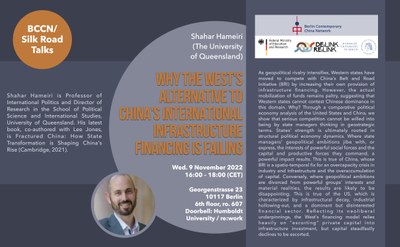09.11.2022 BCCN Silk Road Talk: "Why the West’s Alternative to China’s International Infrastructure Financing is Failing" by Shahar Hameiri
- https://www.iaaw.hu-berlin.de/de/ostasien/neuigkeiten/aktuelles_archiv/09-11-2022-bccn-silk-road-talk-why-the-west2019s-alternative-to-china2019s-international-infrastructure-financing-is-failing-by-shahar-hameiri
- 09.11.2022 BCCN Silk Road Talk: "Why the West’s Alternative to China’s International Infrastructure Financing is Failing" by Shahar Hameiri
- 2022-11-09T16:00:00+01:00
- 2022-11-09T18:00:00+01:00
- Wann 09.11.2022 von 16:00 bis 18:00
- Wo Georgenstrasse 23; 10117 Berlin; 6th floor, ro. 607; doorbell: Humboldt University / re:work
- Name des Kontakts Sarah Eaton
-
iCal
Dear students and colleagues,
We cordially invite you to join our BCCN Silk Road Talk #1
Why the West’s Alternative to China’s International Infrastructure Financing is Failing
Speaker: Prof. Shahar Hameiri
Abstract
As geopolitical rivalry intensifies, Western states have moved to compete with China’s Belt and Road Initiative (BRI) by increasing their own provision of infrastructure financing. However, the actual mobilization of funds remains paltry, suggesting that Western states cannot contest Chinese dominance in this domain. Why? Through a comparative political economy analysis of the United States and China, we show that serious competition cannot be willed into being by state managers thinking in geostrategic terms. States’ strength is ultimately rooted in structural political economy dynamics. Where state managers’ geopolitical ambitions jibe with, or express, the interests of powerful social forces and the capital and productive forces they command, a powerful impact results. This is true of China, whose BRI is a spatio-temporal fix for an overcapacity crisis in industry and infrastructure and the overaccumulation of capital. Conversely, where geopolitical ambitions are divorced from powerful groups’ interests and material realities, the results are likely to be disappointing. This is true of the US, which is characterized by infrastructural decay, industrial hollowing-out, and a dominant but disinterested financial sector. Reflecting its neoliberal underpinnings, the West’s financing model relies heavily on “escorting” private capital into infrastructure investment, but capital steadfastly declines to be escorted.
Shahar Hameiri is Professor of International Politics and Director of Research in the School of Political Science and International Studies, University of Queensland. His latest book, co-authored with Lee Jones, is Fractured China: How State Transformation is Shaping China’s Rise (Cambridge, 2021). His earlier co-authored books include: Governing Borderless Threats: Non-Traditional Security and the Politics of State Transformation (Cambridge, 2015), and International Intervention and Local Politics (Cambridge, 2017). He is also the co-editor, with Toby Carroll and Lee Jones, of The Political Economy of Southeast Asia (Palgrave Macmillan, 2020). He tweets @ShaharHameiri.
For more on this and other BCCN events, visit the BCCN homepage.


